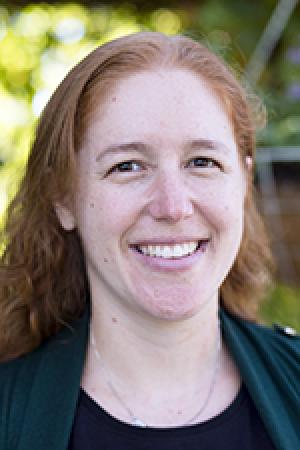People
Erin Baldinger
-
Pronouns: she, her, hers
-
Associate Professor
My research centers on the preparation of secondary mathematics teachers. These areas of interest have emerged from my experiences as a middle school math teacher and as a mathematics teacher educator.
PhD, Stanford University, mathematics education
BA, Tufts University, mathematics
Mathematics teacher preparation; mathematical knowledge for teaching; practice-based teacher education
My research centers on the preparation of secondary mathematics teachers. These areas of interest have emerged from my experiences as a middle school math teacher and as a mathematics teacher educator. I view teaching as complex and improvisational work, and learning to teach requires learning to make nuanced and context-dependent decisions in non-routine spaces. Practice-based teacher education is envisioned by many scholars as a critical mechanism for learning to teach in adaptive ways. My research in practice-based teacher education focuses on approximations of practice, such as coached rehearsals and scripting tasks, as strategies for supporting teachers to learn core practices such as responding to errors and leading mathematics discussions. I draw on socio-cultural learning theories to guide my research with pre-service and in-service teachers. In addition to learning the practices of mathematics teaching, I also study the development of mathematical knowledge for teaching among secondary teachers. A historical problem within mathematics education is the discontinuity teachers sometimes feel between secondary and tertiary mathematics. My research addresses the challenge of connecting advanced and secondary mathematics by investigating teachers' development of content knowledge and pedagogical content knowledge as part of their mathematical preparation for teaching. I have used the lens of authority relations to unpack this discontinuity and theorize about how to strengthen the bridge between secondary and tertiary mathematics.
What can students expect from me?
Please read my advising statement.
Associations and Memberships
- American Educational Research Association (AERA)
- Association of Mathematics Teacher Educators (AMTE)
- National Council of Teachers of Mathematics (NCTM)
- Psychology of Mathematics Education, North America Chapter (PME-NA)
Courses Taught
- CI 8132: Curriculum and Instruction
- Core: Teaching Theory and Research
- CI 8572: Learning Theory and Classical Research in STEM Education
- MTHE 3102: Mathematics and Pedagogy for Elementary Teachers II
- MTHE 5021: Algebraic Structures in School Mathematics
- MTHE 5031: Geometric Structures in School Mathematics
- MTHE 5314: Teaching and Learning Mathematics
- MTHE 8571: Current Research in Mathematics Education
Munson, J., Baldinger, E. E., Altshuler, M. G, & Lee, H. S. U (2024). Side-by-side coaching: Decomposing a practice-embedded teacher learning opportunity. Learning, Culture and Social Interaction, 45, 100807. https://doi.org/10.1016/j.lcsi.2024.100807
Munson, J., & Baldinger, E. E. (2023). What pedagogy feels like: Teachers’ development of pedagogical empathy in rehearsal debriefs. Journal of the Learning Sciences, 32(4–5), 1-622–662. https://doi.org/10.1080/10508406.2023.2269547
Campbell, M. P., & Baldinger, E. E. (2022). Using scripting tasks to reveal mathematics teacher candidates’ resources for responding to student errors. Journal of Mathematics Teacher Education, 25, 507–531. https://doi.org/10.1007/s10857-021-09505-4
Baldinger, E. E., & Campbell, M. P. (2021). Making learning visible: Cases of teacher candidates learning to respond to errors through multiple approximations of practice. Mathematics Teacher Education and Development, 23(4), 119–142. https://mted.merga.net.au/index.php/mted/article/view/632
Lai, Y., & Baldinger, E. E. (2021). Authority relations and the tertiary-to-secondary (dis)continuity. For the Learning of Mathematics, 41(2), 26–31.
Graif, F.G, Baldinger, E. E., & Campbell, M. P. (2021). Teacher candidates’ reflections on responding to errors: Exploring their vision and goals. The Mathematics Educator, 30(1), 3–24. https://openjournals.libs.uga.edu/tme/article/view/2092
Baldinger, E. E., Campbell, M. P., & Graif, F. G (2021). Learning to respond to students in discussions: Examining the use of planted errors in an approximation of practice. Journal of Teacher Education, 72(5), 523–537. https://doi.org/10.1177/0022487120977148
Munson, J., Baldinger, E. E., & Larison, S.G (2021). What if … ? Exploring thought experiments and non-rehearsing teachers’ development of adaptive expertise in rehearsal debriefs. Teaching and Teacher Education, 97, 103222. https://doi.org/10.1016/j.tate.2020.103222
Campbell, M. P., Baldinger, E. E., & Graif, F.G (2020). Representing student voice in an approximation of practice: Using planted errors in coached rehearsals to support teacher candidate learning. Mathematics Teacher Educator, 9(1), 23–49. https://doi.org/https://doi.org/10.5951/MTE.2020.0005
Baldinger, E. E., Staats, S., Covington Clarkson, L. M., Gullickson, E.G, Norman, F.G, & Akoto, B.G (2020). Returning voice to the silent M: A review of conceptions of mathematics in integrated STEM education. In J. Anderson & Y. Li (Eds.), Integrated Approaches to STEM Education (pp. 67–90). Springer. https://doi.org/10.1007/978-3-030-52229-2_5
Baldinger, E. E., & Munson, J. (2020). Developing adaptive expertise in the wake of rehearsals: An emergent model of the debrief discussions of non-rehearsing teachers. Teaching and Teacher Education, 95, 103125. https://doi.org/10.1016/j.tate.2020.103125
Baldinger, E. E., Campbell, M. P., & Graif, F.G (2020). Sorting out definitions. Mathematics Teacher: Learning and Teaching Pre-K-12, 113(3), 209-215. https://doi.org/10.5951/MTLT.2019.0121
Baldinger, E. E. (2020). Reasoning about student written work through self-comparison: How pre-service secondary teachers use their own solutions to analyze student work. Mathematical Thinking and Learning, 22(1), 56-78. https://doi.org/10.1080/10986065.2019.1624930
Baldinger, E. E., & Lai, Y. (2019). Pedagogical context and proof validation: The role of positioning as a teacher or student. Journal of Mathematical Behavior, 55(April), 100698. https://doi.org/10.1016/j.jmathb.2019.03.
Baldinger, E. E. (2018). Learning mathematical practices to connect abstract algebra to high school algebra. In N. H. Wasserman (Ed.), Connecting Abstract Algebra to Secondary Mathematics, for Secondary Mathematics Teachers (pp. 211–239). New York: Springer International Publishing. http://doi.org/10.1007/978-3-319-99214-3_11

-
Curriculum and Instruction
Learning and Environmental Sciences Bldg (LES) 320E
1954 Buford Avenue
St Paul, MN 55108
- 612-624-9478
- baldi013@umn.edu